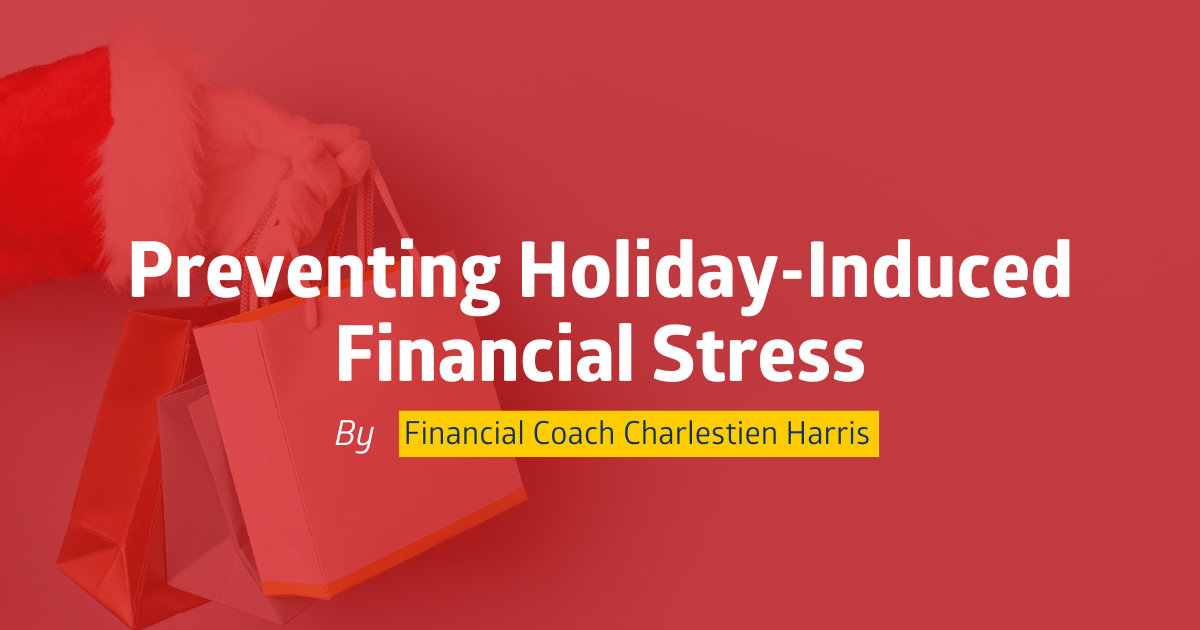By Charlestien Harris
Often, we are told to get in the “holiday” spirit. But what does that really mean? For some of us, it means adopting a more festive attitude or mood. For others, it means wondering how to pay for the extra food, gifts, and costs incurred while trying to make the holidays more meaningful for ourselves or our families. Retailers often capitalize on these moments by offering tempting deals that can lead us to “sink” our budget.
We don’t always realize the financial danger we face when we overspend during the holidays. It is critical to stick to your holiday spending budget to help make the holidays less stressful. You already have enough going on with shopping, planning travel, and family gatherings, which can distract you from realizing that you have overspent.
Here are some ways you can stay on track and lower your financial stress level during the holidays:
- Set aside extra funds. As part of tracking your holiday spending during November and December, be sure to set aside extra money to cover any credit card debt that has accumulated during the holidays. This will help reduce any post-holiday financial strain and help you start the new year on a positive financial note. It is important to do this within your financial means and not let holiday spending put a damper on your overall financial situation.
- Expect the unexpected. No, I am not saying you can predict the future—no one can—but some events are pretty common, like having extra family or guests show up or finding that prices on some items you need are a little higher than expected. But don’t panic; it will be okay. Just remember number one: you have set aside some extra money to cover this already!
- Use technology to your advantage. One great way to reduce your financial stress is to automate much of your money management duties. Take advantage of autopay options to reduce the number of bills and payments you have to remember each month. You can also set up an automatic savings plan to build an emergency fund for future financial needs. Some apps will allow you to track your spending and savings habits automatically.
- Identify triggers for impulse purchases. You can control what and how you spend your money. You know yourself, so knowing what triggers you to spend impulsively will go a long way toward reducing your stress level. You would be surprised how easy it is to pick up small things you don’t need, so ensuring you’ve budgeted for it and tracked it will really help curtail unnecessary spending.
- Set clear goals and priorities. One of the best ways to reduce financial stress is to set clear financial goals. Creating these goals and priorities can assist you with regaining control and focus, setting you on the path toward financial freedom. Take time to define your short- and long-term financial goals. What do you want to achieve, and why is it important? Maybe you want to build an emergency fund, pay off your credit cards, or save for a major purchase. Whatever the goals may be, write them down and prioritize them. Having a clear direction allows you to make better decisions when money is tight. It also makes it easier to handle financial stress because you have a plan in place and know what to focus on.
Financial stress doesn’t have to control your life. By taking small, manageable steps and seeking help when needed, you can maintain control of your finances and reduce your stress levels. Whether it’s setting clear goals, creating a financial plan, identifying your triggers, or building an emergency fund, the key is to take action and stay committed.
For more information about this and other financial topics, you can email me at Charlestien.Harris@banksouthern.com or call me at 662-624-5776.
Until next week – stay financially fit!
